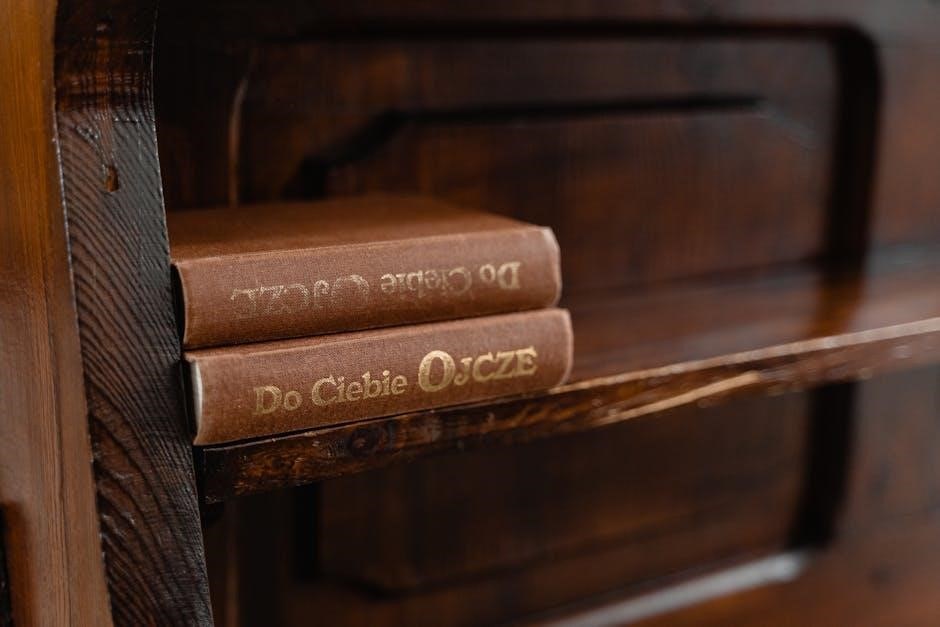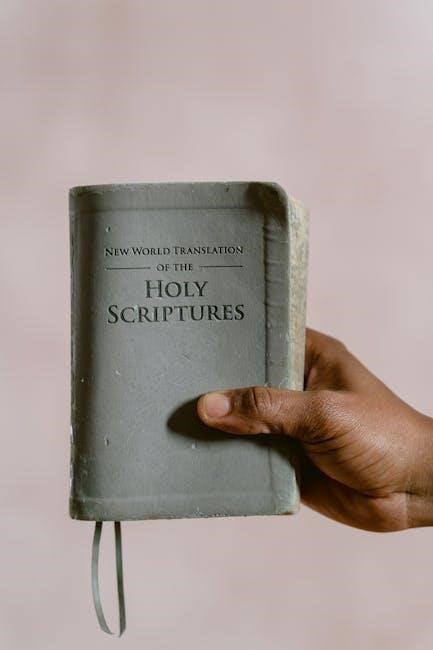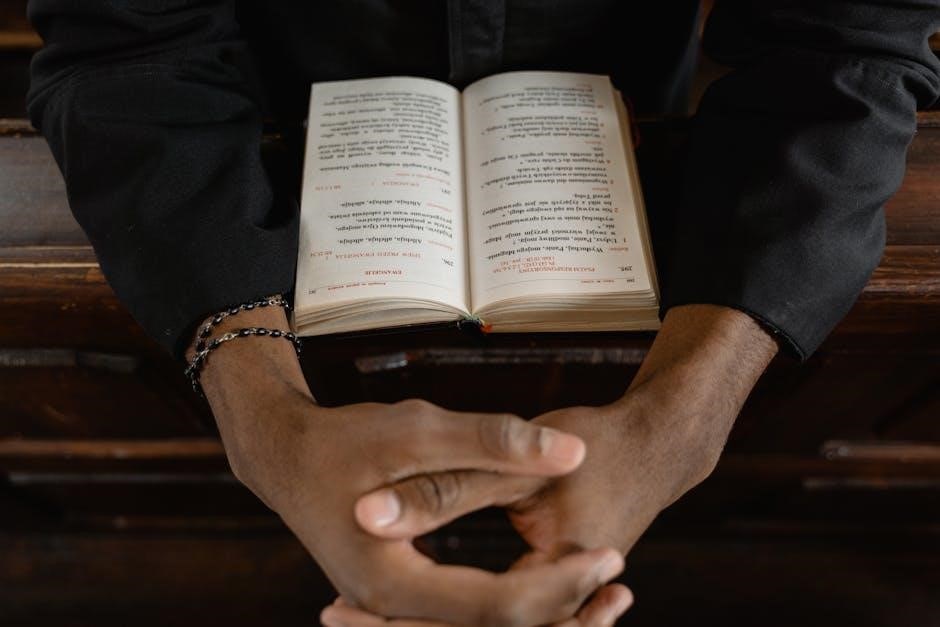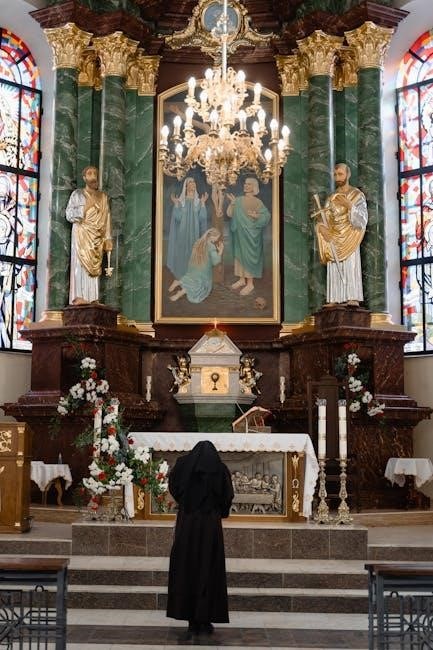
Discover the richness of Scripture with a Catholic Bible study guide‚ blending tradition‚ Church teachings‚ and practical tools like lectionaries and concordances for a deeper faith journey.
Importance of Bible Study in Catholicism
Bible study is a cornerstone of Catholic faith‚ offering a deeper connection to God’s Word and the Church’s teachings. It strengthens personal faith‚ fosters spiritual growth‚ and enriches participation in liturgy. Through Scripture‚ Catholics encounter the living Word of God‚ which illuminates their path and guides moral decisions. Regular Bible study also fosters a sense of community‚ as believers come together to reflect on shared values and traditions. The Church emphasizes the importance of Scripture in daily life‚ as seen in the lectionary readings and liturgical celebrations. By engaging with the Bible‚ Catholics can better understand their role in the story of salvation and live out their faith with greater purpose and joy. This practice is not only a personal devotion but also a way to integrate Church doctrine into everyday life‚ deepening one’s relationship with Christ and the Catholic community.
Purpose of a Catholic Bible Study Guide
A Catholic Bible study guide serves as a comprehensive resource to deepen understanding of Scripture through a lens of Catholic tradition and doctrine. It provides structured lessons‚ commentary‚ and tools like concordances and maps to enhance study. These guides often include reference articles‚ glossaries‚ and reflections from Church scholars‚ making complex biblical concepts accessible. They also align with the liturgical calendar‚ connecting Scripture to the Mass and daily life. Designed for both individual and group use‚ these guides foster spiritual growth and community engagement. By integrating Church teachings‚ they help Catholics apply biblical truths to their lives‚ enriching their faith journey and fostering a deeper relationship with God. Whether for personal reflection or group discussion‚ a Catholic Bible study guide is an essential companion for navigating the richness of God’s Word.

Understanding the Structure of the Catholic Bible
The Catholic Bible includes the Old and New Testaments‚ with additional deuterocanonical books like Tobit and Sirach‚ offering a rich tapestry of God’s revelation and salvation history.
Overview of the Catholic Bible
The Catholic Bible is a comprehensive sacred text comprising the Old and New Testaments‚ along with seven deuterocanonical books. It is divided into 73 books‚ including Tobit‚ Judith‚ and Sirach‚ which are not found in Protestant Bibles. The Old Testament narrates creation‚ the history of Israel‚ and God’s covenant with His people‚ while the New Testament focuses on the life‚ teachings‚ death‚ and resurrection of Jesus Christ and the early Christian Church. The Bible is further organized into genres such as law‚ history‚ wisdom literature‚ prophecy‚ Gospels‚ epistles‚ and apocalyptic writings. Study guides often highlight these divisions‚ providing context and deeper understanding. Features like maps‚ timelines‚ and cross-references enhance study‚ making the Catholic Bible a rich resource for spiritual growth and theological exploration.

Differences Between Catholic and Protestant Bibles
The Catholic Bible includes seven additional books known as the deuterocanonical books—Tobit‚ Judith‚ Wisdom‚ Sirach‚ Baruch‚ and 1 and 2 Maccabees—which are not found in Protestant Bibles. These texts were part of the original Greek Septuagint but were later excluded by Protestants during the Reformation. The Catholic Church‚ at the Council of Trent‚ affirmed these books as canonical‚ emphasizing their historical and theological significance. While both traditions share the same 66 books of the Old and New Testaments‚ the Catholic Bible’s inclusion of these extra texts reflects its broader understanding of sacred Scripture. This distinction is a key aspect of Catholic Bible study‚ as these books provide additional insights into Jewish history‚ wisdom‚ and the period between the Old and New Testaments.
The Deuterocanonical Books
The deuterocanonical books—Tobit‚ Judith‚ Wisdom‚ Sirach‚ Baruch‚ and 1 and 2 Maccabees—are essential texts in the Catholic Bible‚ offering rich theological and historical insights. These books‚ written in the intertestamental period‚ provide narratives of Jewish history‚ wisdom teachings‚ and apocalyptic visions. Tobit and Judith highlight themes of faith‚ morality‚ and divine providence‚ while Wisdom and Sirach explore ethical living and the nature of God. Baruch reflects on Israel’s exile and redemption‚ and the Maccabees recount the Jewish revolt against Greek oppression. These texts are deeply rooted in Jewish tradition and are integral to Catholic Scripture‚ enriching the understanding of God’s covenant with His people. They are not found in Protestant Bibles‚ making them a distinctive feature of Catholic Bible study‚ and are often referenced in Catholic liturgy and devotion. Their inclusion emphasizes the Catholic Church’s commitment to the fullness of sacred Scripture.
Choosing the Right Catholic Bible
Selecting a Catholic Bible involves considering translations like the NABRE‚ study features‚ and devotional content to suit personal or group study needs effectively and meaningfully.
Popular Catholic Bible Translations
When selecting a Catholic Bible‚ choosing the right translation is crucial. The New American Bible Revised Edition (NABRE) is widely used in Catholic study guides due to its clarity and fidelity to the original texts. The Revised Standard Version‚ Catholic Edition (RSV-CE) is another popular choice‚ known for its precise translation and literary style. The Douay-Rheims Bible is favored for its traditional language and closeness to the Latin Vulgate. Additionally‚ the New Jerusalem Bible (NJB) is appreciated for its fresh‚ engaging translation and extensive study notes. These translations are often included in Catholic study guides because they balance scholarly accuracy with readability‚ making them ideal for both personal and group study. Understanding the strengths of each translation helps Catholics choose the one that best supports their spiritual and educational needs.
Study Bibles vs. Devotional Bibles
When exploring Catholic Bible study resources‚ it’s important to distinguish between study Bibles and devotional Bibles. Study Bibles are designed for in-depth analysis‚ often featuring extensive notes‚ cross-references‚ and scholarly commentary. They are ideal for those seeking to understand historical context‚ theological themes‚ and scriptural interpretations. Devotional Bibles‚ on the other hand‚ focus on personal reflection and spiritual growth‚ offering daily readings‚ prayers‚ and inspirational insights. While study Bibles are more academic‚ devotional Bibles nurture a deeper personal connection with Scripture. Both types are valuable‚ but they serve different purposes. For structured learning‚ a study Bible is essential‚ while a devotional Bible complements prayer and meditation. Understanding their unique roles helps Catholics choose the right tool for their spiritual journey‚ whether it’s academic study or heartfelt devotion. This distinction is key to maximizing the benefits of either resource.
Features to Look for in a Study Bible
When selecting a Catholic study Bible‚ look for features that enhance understanding and deepen faith. Key elements include extensive footnotes and cross-references that provide historical context and theological insights. A comprehensive concordance helps locate specific passages‚ while introductions to each book offer valuable background information. Many study Bibles also include reference articles on key topics‚ such as the liturgical year or Church doctrine. Full-color maps and timelines can visually enrich your study‚ while a glossary of biblical terms clarifies unfamiliar language. Additionally‚ some Bibles feature the complete Sunday and weekday lectionaries‚ connecting Scripture to the liturgical cycle; Ensure the translation aligns with Catholic traditions‚ such as the New American Bible (NAB). These features collectively create a robust tool for both personal and group study‚ fostering a deeper engagement with God’s Word. Choose a Bible that balances academic rigor with spiritual inspiration.
Preparing for Bible Study
Begin with essential tools like a Catholic study Bible‚ concordance‚ and lectionary. Create a quiet‚ distraction-free space and establish a consistent routine to deepen your spiritual engagement with Scripture.
Essential Tools for Bible Study
A Catholic Bible study guide recommends several essential tools to enhance your experience. First‚ a Catholic study Bible is crucial‚ as it includes annotations‚ footnotes‚ and cross-references tailored to Catholic teachings. A concordance helps locate specific verses by keyword‚ while a lectionary connects Scripture to the liturgical year. Additional resources like reference articles and maps provide historical and cultural context. For personal reflection‚ a journal can be invaluable for recording insights and prayerful meditations. These tools‚ when used together‚ create a comprehensive and enriching Bible study environment that fosters spiritual growth and deeper understanding of God’s Word.
Setting Up a Study Environment
Creating a conducive study environment is vital for effective Catholic Bible study. Begin by selecting a quiet‚ comfortable space free from distractions. Ensure good lighting and minimal noise to foster focus. Organize your resources‚ such as your Catholic Bible‚ study guide‚ journal‚ and reference materials‚ within easy reach. Incorporate elements like a crucifix or religious icons to inspire a prayerful atmosphere. Consider using a desk or table to keep materials organized and accessible. Establishing a consistent routine‚ such as studying at the same time daily‚ helps cultivate discipline. Start each session with prayer to seek guidance and openness to God’s Word. Optional tools like highlighters or a laptop for note-taking can enhance your experience. A well-prepared environment sets the stage for a fruitful and spiritually enriching Bible study journey.
Developing a Study Routine
Establishing a consistent study routine is essential for deepening your understanding of Scripture. Begin by setting a specific time and day for Bible study‚ ensuring it fits seamlessly into your daily schedule. Start each session with prayer‚ asking for clarity and openness to God’s Word. Use a Catholic Bible study guide to structure your sessions‚ incorporating lectionary readings or specific book studies. Allocate time for reading‚ reflection‚ and note-taking‚ allowing the Word to resonate in your heart. Consider varying your approach by alternating between personal study and group discussions. Track your progress with a journal or digital tool to stay motivated. Consistency is key‚ but remain flexible to adapt your routine as needed. By committing to regular study‚ you’ll foster a deeper connection with Scripture and enrich your spiritual life. Make it a habit to apply what you learn‚ integrating faith into daily living.

Methods and Techniques for Effective Bible Study
Engage with Scripture through prayer‚ contextual understanding‚ and application to daily life‚ using tools like concordances and lectionaries for a deeper‚ Spirit-led study experience.

The Importance of Prayer in Bible Study
Prayer is the foundation of Catholic Bible study‚ inviting the Holy Spirit to illuminate understanding and guide interpretation. Begin and end each session with prayer‚ seeking God’s wisdom and grace. Through prayer‚ Scripture comes alive‚ transforming study into a spiritual encounter. Reflect on how the Word of God applies to daily life‚ fostering a deeper relationship with Christ. Prayer helps discern the divine message‚ making study a sacred dialogue with God. Regular prayer also cultivates humility and openness‚ essential for receiving the fullness of God’s revelation; By integrating prayer‚ Bible study becomes a powerful means of spiritual growth and renewal‚ rooted in faith and tradition.
Understanding Context and Interpretation
Understanding the historical and cultural context of Scripture is crucial for accurate interpretation. The Catholic Bible study guide emphasizes the importance of grasping the setting in which biblical events occurred. This includes exploring the customs‚ languages‚ and traditions of ancient Israel and the early Christian community. Contextual understanding helps avoid misinterpretations and reveals the deeper meaning of God’s Word. Additionally‚ the role of the Magisterium and Church Tradition provides a framework for interpreting Scripture in harmony with Catholic teachings. By studying the Bible within its historical and theological context‚ readers can uncover its timeless truths and apply them to their lives. This approach fosters a richer‚ more meaningful engagement with the Word of God‚ ensuring that study is both informative and transformative.
Applying Scripture to Daily Life
Applying Scripture to daily life is a cornerstone of Catholic Bible study‚ enabling believers to live out their faith authentically. A Catholic Bible study guide provides practical tools to connect biblical teachings with modern experiences. Through reflection‚ prayer‚ and action‚ individuals can integrate God’s Word into their decisions‚ relationships‚ and challenges. The guide often includes devotional insights‚ real-life examples‚ and spiritual exercises to help readers discern how Scripture applies to their unique circumstances. This process fosters personal growth‚ deepens faith‚ and encourages living as disciples of Christ. By applying Scripture‚ Catholics can navigate life’s complexities with wisdom‚ compassion‚ and hope‚ transforming their lives and the world around them. This practical approach ensures that Bible study is not just an intellectual exercise but a spiritual journey that shapes everyday living.
The Role of Tradition and Church Teaching
Catholic Bible study is deeply rooted in tradition and Church teaching‚ providing a framework for understanding Scripture in harmony with Catholic doctrine and fostering a richer faith experience.
The Catechism and Scripture
The Catechism of the Catholic Church serves as a vital companion for Bible study‚ as it systematically presents the teachings of the Church in harmony with Scripture. It frequently references biblical passages to explain Catholic doctrine‚ making it an essential tool for understanding the faith. For instance‚ the Catechism uses Scripture to elaborate on the Creed‚ the Sacraments‚ and moral teachings‚ providing a deeper context for biblical truths. By integrating the Catechism into Bible study‚ Catholics can gain a more comprehensive understanding of how Scripture informs Church teachings. This approach ensures that study remains grounded in both the Word of God and the traditions of the Church‚ fostering a holistic faith journey. The Catechism also highlights key themes‚ such as the Eucharist and the role of Mary‚ offering a rich framework for applying Scripture to daily life.
The Role of the Magisterium
The Magisterium‚ the teaching authority of the Catholic Church‚ plays a crucial role in guiding the interpretation of Scripture. It ensures that biblical study remains faithful to the Church’s traditions and doctrines. The Magisterium‚ composed of bishops in communion with the Pope‚ provides authoritative interpretations of Scripture‚ resolving disputes and clarifying ambiguities. This authority is rooted in the belief that the Holy Spirit guides the Church in understanding the Word of God. Catholic Bible study guides often incorporate Magisterial teachings‚ such as those from Church councils and papal encyclicals‚ to help believers grasp the deeper meaning of Scripture. By relying on the Magisterium‚ Catholics can navigate complex theological questions with confidence‚ ensuring their study of the Bible aligns with the Church’s universal and enduring teachings. This fosters unity and orthodoxy‚ essential for a vibrant and authentic faith life. The Magisterium thus serves as a safeguard and a source of illumination for Catholic Bible study.
Integrating Church Doctrine into Study
Integrating Church doctrine into Bible study enriches understanding by connecting Scripture to the teachings of the Catholic Church. This approach ensures that biblical interpretation aligns with the Church’s traditions and beliefs. Catholic Bible study guides often emphasize the Catechism of the Catholic Church as a key resource‚ providing clarity on doctrinal matters. By referencing Church teachings‚ such as those from councils and papal documents‚ students can deepen their grasp of Scripture’s relevance to Catholic faith and practice. This integration fosters a holistic understanding of the Bible‚ revealing how its truths are lived out in the Church’s sacraments‚ moral teachings‚ and liturgical life. Study guides also highlight the importance of the Magisterium in guiding interpretation‚ ensuring that personal study remains rooted in the Church’s authoritative tradition. This harmonious blend of Scripture and doctrine nurtures a faith that is both informed and lived authentically.

Using the Lectionary and Liturgical Resources
The lectionary and liturgical resources deepen Bible study by connecting Scripture to the Church’s liturgical cycle‚ enhancing understanding of the Word within the Catholic tradition and practice.

The Sunday and Weekday Lectionaries
The Sunday and Weekday Lectionaries are essential tools for Catholics‚ providing a structured approach to reading Scripture throughout the liturgical year. The Sunday Lectionary follows a three-year cycle‚ while the Weekday Lectionary spans a two-year cycle‚ ensuring a comprehensive exposure to the Bible. These lectionaries organize readings from the Old and New Testaments‚ Psalms‚ and epistles‚ connecting them to the liturgical seasons and feast days. By following the lectionaries‚ Catholics can deepen their understanding of Scripture in the context of the Church’s traditions and practices. They also serve as a guide for personal prayer and group study‚ helping to link the Word of God to daily life. Using the lectionaries alongside a Catholic Bible study guide enhances the ability to apply biblical teachings meaningfully and prayerfully.
Connecting Scripture to the Liturgical Year

Connecting Scripture to the liturgical year enriches Catholic Bible study by aligning biblical readings with the Church’s seasons and feast days. The lectionary organizes readings to reflect the spiritual journey of the Church‚ from Advent to Easter‚ and beyond. This structure helps Catholics encounter Scripture in a way that resonates with the mysteries of faith celebrated throughout the year; For example‚ during Lent‚ readings focus on conversion and preparation for Easter‚ while Advent emphasizes hope and anticipation. This connection deepens the relevance of Scripture to daily life and faith. By studying the Bible in harmony with the liturgical year‚ Catholics can better understand the Church’s traditions and apply biblical teachings to their spiritual lives. This approach‚ supported by a Catholic Bible study guide‚ fosters a deeper appreciation of how Scripture informs and transforms faith within the communal life of the Church.
Using Liturgical Resources for Deeper Study
Liturgical resources‚ such as the Sunday and weekday lectionaries‚ are invaluable for deepening Catholic Bible study. These resources provide structured readings that align with the Church’s liturgical calendar‚ helping Catholics connect Scripture to the spiritual rhythms of the year. The lectionary‚ for instance‚ offers a three-year cycle of readings‚ ensuring a broad exposure to biblical texts. Additionally‚ many Catholic Bible study guides include reference articles‚ full-color maps‚ and timelines to enhance understanding. These tools help contextualize Scripture within the broader narrative of salvation history. By incorporating liturgical resources‚ Catholics can engage with the Bible in a way that reflects the Church’s traditions and teachings. This approach not only enriches personal study but also fosters a communal understanding of Scripture‚ making it easier to apply biblical truths to daily life and strengthen one’s faith journey.

Practical Tips for Group Bible Study
Foster participation by encouraging open discussion and using structured guides. Utilize liturgical resources and study materials to keep the group engaged and focused on Scripture.
Leading a Catholic Bible Study Group
Leading a Catholic Bible study group requires preparation‚ prayer‚ and a commitment to fostering spiritual growth. Begin by creating a structured plan‚ incorporating resources like the New American Bible and the Lectionary. Encourage active participation by asking open-ended questions and promoting respectful dialogue. Use study guides and reference materials to deepen understanding. Pray with the group at the start and end of each session‚ seeking the Holy Spirit’s guidance. Be approachable and open to questions‚ ensuring all members feel valued. Rotate facilitation roles to empower others and build community. Regularly assess the group’s needs and adjust your approach to keep the study engaging and meaningful. By combining faith‚ knowledge‚ and fellowship‚ you can help your group grow closer to God and one another.
Encouraging Participation and Discussion
Fostering an environment of open dialogue is key to a successful Catholic Bible study. Encourage participants to share insights by asking open-ended questions and creating a safe space for reflection. Use the Lectionary and reference materials to spark meaningful conversations. Rotate discussion leaders to empower members and diversify perspectives. Incorporate prayer and reflection to deepen engagement. Encourage participants to connect Scripture to their personal lives‚ fostering a sense of community and shared faith. Provide opportunities for silent reflection and small group discussions to ensure all voices are heard. By promoting active listening and respectful dialogue‚ you can create a dynamic and enriching experience for everyone involved. Regular feedback and adaptability will help maintain engagement and ensure the study remains relevant and impactful for all participants.
Handling Common Challenges in Group Study
Leading a Catholic Bible study group can present challenges‚ such as differing opinions or quiet participants. Address these by fostering a respectful environment where all voices are valued. Encourage active listening and remind members to focus on understanding rather than debating. Use prayer to guide discussions and maintain a spiritual tone. If conversations stray‚ gently refocus on the study material. For those who dominate discussions‚ set ground rules like time limits for sharing. For quieter members‚ pose open-ended questions to draw them in. Utilize study guides or reference materials to clarify confusing passages. Emphasize the importance of preparation to keep discussions meaningful. By addressing these challenges proactively‚ you can create a balanced and enriching experience for all participants‚ ensuring everyone feels heard and valued in their faith journey.
Embark on a lifelong journey of faith by applying Scripture to daily life. Stay committed to study‚ prayer‚ and community‚ deepening your relationship with God and His Word.

Continuing Your Bible Study Journey
Deepen your faith by embracing a lifelong commitment to Scripture. Utilize resources like the Lectionary and concordance to enrich your study. Engage with parish groups or online communities for shared insights and encouragement. Explore advanced topics‚ such as the Catechism and Church doctrine‚ to integrate Scripture into daily life. Consider enrolling in Bible courses or attending retreats for deeper understanding. Regular prayer and reflection will keep your study vibrant and meaningful. Remember‚ Bible study is a journey‚ not a destination—stay curious‚ stay committed‚ and let God’s Word guide you.